NORMIE ROWE
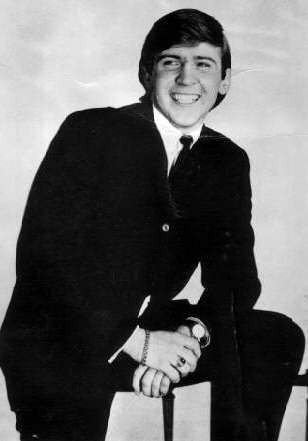
Normie Rowe as he looked
the peak of his popularity in 1966.
(Photo courtesy NormieRowe.com)
|
Normie Rowe (vocals)
backed by The Playboys (1964-67):
The
Playboys Mk I
(1964 - Sep. 1966)
Bill Billings (lead guitar)
Phil Blackmore (organ, piano)
John Cartwright (rhythm guitar)
Neil McArthur (bass)
Graham Trottman (drums)
The Playboys Mk II
(Sep. 1966 - Apr. 1967)
Phil Blackmore (organ, piano)
Rod Stone (guitar, vocals) Sep. 1966 - Apr. 1967
Brian Peacock (bass, vocals)
Graham Trottman (drums)
The
Playboys Mk III
(Apr. - Oct. 1967)
Trevor Griffin (organ, vocals)
Brian Peacock (bass, vocals)
Mick Rogers (guitar, vocals)
Graham Trottman (drums)
|
History
Normie Rowe AM was the first and biggest male solo star of
Australian
pop in the 1960s. A strong singer and a natural performer, his
bright, edgy tenor voice was showcased in well-chosen material, much of
which was produced by the legendary Pat
Aulton,
house producer for the Sunshine,
Spin
and Festival
labels. Supported by the assured performances of his backing band The
Playboys, Normie cut a
string of classic beat singles on the Sunshine label that kept him at
the top of charts for two years and made him the
most popular Australian solo singer of the "beat"
era. Normie's
double-sided hit "Que Sera Ser" / "Shakin' All Over" is cited
as the top-selling Australian single
of the 1960s and is sitll one of the biggest-selling Australia
recordings of all time.
Between 1965 and 1967 Normie was unquestionably the biggest
male pop star in Australia, and his only serious rivals in the
teen-idol stakes were Stevie
Wright, Billy Thorpe and Ray Brown. Normie's presence was guaranteed to
generate mass-hysteria of Beatle-esque proportions wherever he
appeared. For two years he reigned supreme as Australia's first "King
of Pop" but his call-up for compulsory military service in late 1967
and his subsequent tour of duty in Vietnam dramatically curtailed his
pop career, and he was never able to recapture the massive success he
enjoyed at his peak, although he remains a popular and much-loved
entertainer to this day.
Normie (b.1 Feb, 1947) was drawn to music early in life. He
began singing with his local church choir in Melbourne while at primary
school. Normie was hooked on rock & roll even before his teens,
and Col Joye became one of his early idols and
inspirations. Normie
took up guitar and formed his first amateur band, The
Valiants, while he was in high school. They performed once a
month at Alphington Methodist Hall. He concentrated on singing, and
made his first stage appearance as a lead vocalist in a music school
concert, aged 14.
"When I was just aspiring to be a singer,
only nine years of age, Col was my idol. He was the boy next door that
I could identify with, not the wild JOK. In fact it was as my first
concert, at the Lou Toppano Music School end of the year concert in
1959 or '60, that I sang Col's 'Rock 'n' Rollin' Clementine'.
I still have the trophy I received for that show. It reads: 'The Best
Performance Of The Night -- Norman Rowe.'
By luck, the show was compered by top Melbourne DJ Stan "The Man" Rofe.
Stan was impressed by Normie's talent and arranged for him to work with
local dance promoter Kevin McClellan. He began performing regularly at
Melbourne dances and discos, backed by instrumental groups like The
Thunderdbirds, The Impostors and finally The
Playboys, who became his permanent band until 1967.
After leaving high school in 1963, Normie had joined the PMG,
the government telecommunications department that was later split into
Telstra
and Australia Post. Normie worked as a trainee technician, but in late
1964 his long hair became an issue with his employers, and in the face
of a "cut it or quit" ultimatum, he left the PMG to become a
professional entertainer.
Working on the Melbourne dance circuit, he
was soon a popular draw and it wasn't long before he was picked to
become a regular on Melbourne pop TV shows like Teen Scene
and The Go!! Show. According to historian Ed
Nimmervol, EMI apparently had the chance to sign him but turned him
down, claiming that he couldnt sing! Brisbane-based independent label Sunshine
had no
such qualms and signed him to a recording and management deal with the
Ivan Dayman organisation.
Sunshine's new house producer, Pat Aulton, was the former lead
singer of
Adelaide band The Clefs (which was, coincidentally, led by Tweed
Harris, who went on
to found The Groove, whose guitarist was former Playboy Rod Stone). In
the liner notes for The
Early Anthology, Pat recalled his introduction to Normie:
"Ivan said to me one day 'We've found
this kid, comae and have a listen and
tell me what you think'. So I saw Normie sing at Preston Town Hall and
thought
'Well, he's pretty good'. The girls loved him, and he had great
presence. He really worked
hard. He'd get out there in front of the crowds and he really punched
the sky, and I liked that.
So I took Normie down to Armstrong Studios to record his debut single."
That first single, released in April 1965, was a brooding
'beat' arrangement of Gegsubwin's "It Ain't Necessarily So"
(from Porgy & Bess) a choice suggested by
Stan Rofe. Normie & the Playboys' version had been inspired by
a version of the song they had heard as an album track by The
Merseybeats.
Backed by his crackling version of "I Just Don't Understand", the
single was huge debut success for the ambitious young singer, making
the Top Ten in most cities and peaking at #6 in Sydney, #1 in
Melbourne, #3 in Brisbane and #5 in Adelaide. Its lower chart position
in Sydney was probably because Sydney pop station 2SM (then owned by
the Catholic Church) banned it because of its supposedly 'sacrilegious'
lyrics.
Normie's first LP was released in July, and his second single,
released in August, was a cover of Ben E. King's "I Who Have
Nothing)"-- a song
also apparently discovered while trawling through Rofe's vast record
collection. It became his second successive Top Ten hit, reaching #10
in Sydney, #4 in Melbourne, #23 in Brisbane and #6 in Adelaide.
Like Dusty Springfield's hit "You Don't Have To Say You Love Me", this
melodramatic 'power ballad'
was actually an English-language version of a earlier Italian pop hit,
originally cut in 1963 by Joe Senteri. Ben E. King's landmark
version, the first in English, featured lyrics by Lieber &
Stoller,
but it was not a wholly original production -- King simply overdubbed
his vocal onto the same backing track used by Senteri. The song has
been much recorded and was comically covered in the
1970s by
Norman Gunston, who used it as the theme song for his hugely successful
ABC-TV show.
Normie's third single, "I Confess" / "Everything's Alright" is
something of a mystery. It didn't show up in any charts and according
to Ian McFarlane it's likely that it was either never issued or was
withdrawn soon after its
release. This seems odd, considering that Normie's version of
"Everything's Alright"
His next single was solid gold. The A-side was a cover of "Que
Sera Sera", the old Doris Day chestnut, which was given a
radical 'merseybeat' update (a la the
Beatles' "Twist & Shout"). According to an
interview excerpt
included on the Early Anthology compilation, the
Playboys were
initially reluctant to record it, but Normie eventually convinced them
to cut the track and the rest is history.
It was backed by his snarling, prowling, downright lascivious
version of the Johnny Kidd
& The Pirates' classic "Shakin' All Over", which many consider
to be one of the best versions on record. As well as showcasing the
awesome power of The Playboys, it's also one of Normie's strongest rock
vocal performances. "Que Sera Sera" / "Shakin' All Over" was a massive
double-sided
hit -- reaching #1 in most capitals in September, including both Sydney
and Melbourne -- a rare feat in those days -- , charting for 28 weeks
and selling in unprecedented numbers -- 80,000 copies according to Ian
McFarlane; Noel McGrath reckons 100,000 -- either way, it became the
biggest-selling Australian record of its day. Normie scored another
first in October by having three hit singles in the Melbourne Top 40
simultaneously.
One of the trademarks of "Que Sera Sera" is
the whistle that sounds at the start of the verse. It has been claimed
that the the whistle was used as a means of cueing Normie's
vocal, but former Playboy Rod Stone suggests that the story is
apocryphal, pointing out that the
whistle device was used on earlier recordings, notably that by The High
Keys (which has a virtually identical arrangement to Normie's version).
The dream run continued through the end of 1965 and into the
first half
of 1966. The impassioned "Tell Him I'm Not Home" (Nov. 1965) was a
cover of a song originally recorded by
Chuck Jackson in 1963; Normie's version was a Top 5 hit in most
mainland capitals,
reaching #4 in Sydney, #2 in Melbourne, #1 in Brisbane and #2 in
Adelaide.
It was followed by his frantic version of Bacharach & David's
"The Breaking Point" (b/w "Ya Ya", Feb.
'66) which became his second double-sided hit, making the Top Ten in
all mainland capitals, peaking at #8 in Sydney, #2 in Melbourne, #1 in
Brisbane, #9 in Adelaide and #2 in Perth. "Pride & Joy" (June
'66) was also Top Ten in most state
capitals.
Mid-year Normie and The Playboys joined forces with The
Easybeats,
Bobby & Laurie and MPD Ltd in one of the biggest Australian
tour
packages yet, "The Big Four" national tour, which that played
to huge crowds and created
pandemonium wherever they appeared.
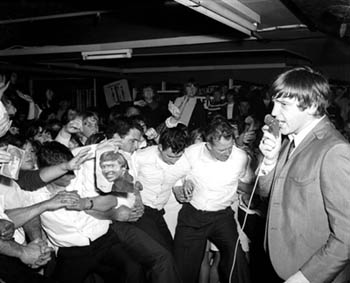 |
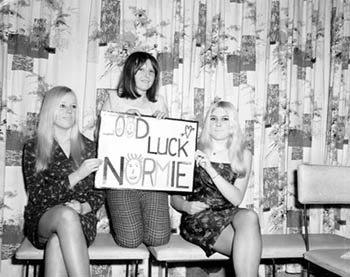 |
Normie-mania at its height: above, left, security
struggles to restrain frantic fans at Normie's farewell concert in
Melbourne
Right, fans faewell Normie at Melbourne Airport on his
departure for the UK
(Photos from the Laurie Richards Collection, Performing Arts Museum, Victorian
Arts Centre)
|
Normie was by this time the most popular solo performer in
Australia, so in August 1966 he left to try his luck in the UK. In
preparation he revamped the Playboys lineup. Cartwright, Billings and
McArthur wanted to stay in Australia for family reasons, so Normie
replaced them with Brian Peacock (bass) and Rod Stone (guitar), both
from the
recently defunct New Zealand band The
Librettos. Arriving in London ahead of his band, Normie took
on Ritchie York as his London agent, and began to record with producers
Trevor Kennedy and John Carter, using the cream of London's session
musos, including Big Jim Sullivan, Jimmy Page, John Paul Jones, famed
drummer Clem
Cattini and vocal group The Breakaways.
The London sessions produced a clutch of new songs -- "Ooh La
La",
"It's Not Easy", "Mary Mary", "Turn On The
Love Light" and "Can't Do Without Your Love". The new songs clearly
benefitted
from the superior recording technology available in the UK and "It's
Not Easy" showcased Normie's best vocal performance to date, revealing
a power and depth in his voice that his earlier Sunshine sides had only
hinted at.
Despite Normie's absence in London,his run of success
continued unabated. His next single, "Ooh La La" / "Ain't Nobody Home"
(Nov. 1966) became yet another double-sided hit Top 5 hit in most
capitals -- #2
in Sydney, #1in Melbourne and Brisbane and #4 n Adelaide. The B-side,
originally
recorded by influential American soul singer Howard Tate, was written
by Jerry Ragovoy, whose other credits include "Time Is On My Side" and
"Piece of My Heart".
Up to this point there had been no generally recognised
national pop chart in Australia, and most pop stations in the state
capitals and major cities published their own competing charts.
However, on 5 October 1966 Go-Set
magazine, which had been
launched in February, began publishing its own weekly national Top 40,
compiled by Ed Nimmervol. "Ooh La La" / "Mary, Mary" debuted at #6 on
the new chart on 7 December 1966, and it hit the top spot in the 21
December chart, giving Normie his first official national #1 hit. It
stayed
at #1 for two weeks before being briefly supplanted by The Easybeats'
"Friday On
My Mind" on 4 January, but returned to the top for the next two
weeks. "Ooh La La" reportedly even made it into the lower end of the
British Top 40.
While "Ooh La La" was riding at the top in Australia, Normie's
next single, the powerful ballad "It's
Not Easy" was also streaking up the chart that It debuted at #17 in the
Go-Set chart in
the last week of December 1966, and reached in the Top Ten by
the second week of January; through the end of January and into
February, Normie enjoyed his greatest chart success to date and
achieved an Australian 'first' by having two singles simultaneously in
the national Top 3 for three consecutive
weeks.
Normie worked in England for ten months and toured with the
likes of Julie Driscoll, Brian Auger & The Trinity, The Spencer
Davis Group, Kiki Dee, Gene Pitney and The Troggs. There were high
hopes of a British breakthrough, and there's no doubt that Normie
had the talent, ambition and work ethic to see it through. In the early
months of 1967 the pages
of Go-Set were filled with breathless predictions
of imminent UK stardom, but it never materialised. Interestingly, it
appears that Normie's UK recordings have developed a strong cult
following in
Britain; one collector's website we located recently lists several of
Normie's UK Singles for sale at very impressive prices -- e.g. "It's
Not Easy" / "Mary, Mary" is valued at UK£55 --
currently (Jan. 2004) about AU$130!
Much has been written about the reasons why Aussie talents
like Normie, The Easybeats, The Twilights and the Masters Apprentices
weren't able to break through in the UK. Some have pointed the finger
at the so-called "Gay Mafia" who allegedly controlled by British pop
industry, but this explanation seems far too simplistic. In retrospect,
the biggest obstacles was the sheer difficultly of making any
impression
against the overwhelming volume of talent on offer in the UK without
top-line management, full support from record labels and a virtually
bottomless bucket of money.
However, something else was happening in the British
broadacsting scene at that time
which may have had a significant impact on the amount of exposure
Australian artists
received on British radio. In the brief period between 1964 and 1967,
British broadcasting was
was shaken to the core by the emergence of pirate radio. Transmitting
from ships and
sea-towers just outside the UK territorial limit, pirate stations like
Radio Caroline and Radio
London shook up the hidebound British music scene with its first taste
of the weird and wonderful
world of commerical pop radio. Although it's not well known today, it's
important to realise that there many Australians were prominently
involved in these pirate
stations -- Radio Caroline was in fact founded by an Aussie, and many
Aussie DJs worked
on the 'pirates' in this period, including former 2SM 'Good Guy' Tony
Withers (now renamed Tony Windsor)
future 2SM breakfast star Ian McRae, and future Sounds
producer Graeme "Spider" Webb.
Several Australian acts including The Easybeats had been given
strong airplay by patriotic 'expat' Aussie
DJs and this seems to have had a major effect on the eventual success
of "Friday On My Mind" in particular.
However, by early 1967 the British government was becoming deeply
concerned about the massive popularity
of the pirate stations and on 1 June 1967 their delivered a double blow
that effectively put the pirates out of business
overnight.
The new Playboys lineup arrived in London in December and
Normie
flew home for Christmas, which no doubt assisted the chart ascent of
"It's
Not Easy". Capping a year of extraordinary success,1966 Normie was
voted Australia's top male singer in the first annual Go-Set
Pop Poll.
Normie returned to England in January and in March 1967 he and
The Playboys embarked on a tour of the UK supporting The Troggs, Gene
Pitney and Sounds Incorporated. Around this time Phil Blackmore left
the group for family reasons and returned to Australia;
he was replaced by English musician Trevor Griffin.
Rod Stone left in soon after, in April 1967 (returning to Australia,
where he joined The
Groove) and he was replaced by former Adam Faith sideman Mick
Rogers.
In June, Normie and The Playboys travelled to North America,
supporting Roy Orbison on a US tour, and along with The Seekers they
represented their country in a special "Australia Day" performance at
Expo '67 in Montreal. Normie returned to Australia in July, where he
appeared as a special guest at
the Hoadleys Battle Of The Sounds final in Melbourne. Graeme Trottman
also returned to Australia
but the rest of the 'new' Playboys remained in the UK, drafting in
former Librettos drummer Craig Collinge to replace Graeme.
he Playboys secured a one-off single deal with Andrew Loog
Oldham's Immediate label, and they recorded and released one single
"Sad" / "Black Sheep RIP" in August. Written by
Brian Peacock, "Sad" is now considered a 'freakbeat'
classic and has been widely anthologised, appearing on the British
collection Chocolate Soup For Diabetics Vol III,
Raven's Kicks and Rhino's recently released
Nuggets
II.
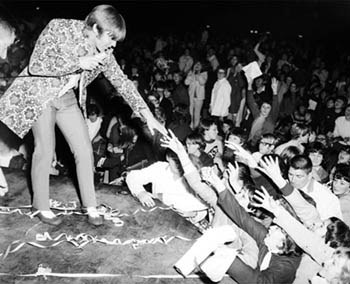
Just back from the UK, special guest
Normie wows the crowd in his new
Carnaby St gear at the Hoadley's Battle Of The Sounds national final in
July 1967
(Photo: Laurie Richards Collection, Performing Arts Museum, Victorian
Arts Centre)
Normie scored another Top Ten hit in late 1967 with "Going
Home" / "I Don't Care". Both sides of this remarkable single are
outstanding -- the A-side was penned by renowned hit-maker Graham
Gouldman -- writer of hits for The Yardbirds, Herman's Hermits and The
Hollies, and later a co-founder of 10CC -- and the B-side is a superb
piece of rocking psych-pop. It debuted at #22 in the Go-Set
chart in late April and stayed in the national Top Ten until the end of
May, peaking at #7.
His next two singles featured four more fabulous slices of
intricately arranged psych-pop, recorded on his return to
the UK, and produced by Giogio Gomelsky.
were perfectly in tune with the times. "Sunshine Secret" / "But I Know"
was released in June 1967 and it was and another single, "Turn Down
Day" charted in
Melbourne.
But in September it all came crashing down when he received
his call-up notice for national service. In October Normie and The
Playboys
parted ways. The group remained in the UK, changed direction and
re-emerged in December as one of Australia's first
progressive rock bands, Procession.
Normie was inducted into the army in February 1968, although
he continued to perform part-time, albeit with a regulation
short-back-and-sides army haircut. At least one TV appearance has
survived of Normie with the army 'do', performing "It's Not
Easy" on Uptight.
He also began working with a new backing
band, Nature's Own, who also reguarly backed Johnny
Farnham and other members of the Sunshine roster. His only charting
record during this period was the lush ballad "Penelope",
written by Procession's Brian Peacock.
Every move of Normie's basic training at Puckapunyal took
place in the full glare
of the media spotlight. He was shipped off to Vietnam in January 1969,
and he served his tour of duty there with distinction, rising to the
rank of Corporal and was Crew Commander of his own armoured personnel
carrier. He was discharged from the army in February
1970. During
Normie's military service, Sunshine (which had been taken
over by Festival) continued to release singles and EPs
Normie had one last minor hit in May 1970 with the song
"Hello",
written by Johnny Young, and he released an album of the same
name. It
was revealed many years later that young's song Smiley,
a major hit for Ronnie Burns, was actually written about Normie. The Hello
album marked the end of his Sunshine contract. He signed to Festival
in 1971, for whom he cut three singles. "Que Sera
Sera"
was re-released in January 1971 and on March 6 he married his
long-time girlfriend Sue Powlesland.
Sadly, his national service stint effectively
killed his pop career, and Normie was never able to recover the
momentum and mass popularity he lost because of the call-up. In his
absence, Ronnie Burns and then Johnny Farnham had stepped into
the
breach and Farnham was now the new King Of Pop. Ironically, Farnham's
birthdate was also pulled out in the national service lottery, but in
his recent book 50
Years Of Rock In Australia
(Wilkinson Publishing), author Jeff Jenkins' revealed that
Farnham's manager Daryl Sambell used his political connections to
prevent Johnny from being drafted.
The strong anti-war
sentiment of the period also affected Normie -- like so many Vietnam
vets, he suffered considerably because of his service, and regrettably,
many people took out their anger about the unpopular and unjust war on
the hapless veterans, who had simply done their duty. In fact Normie
himself has said that he was treated like a pariah by the very people
who had been buying his records and screaming at his concerts only a
couple of years
before. One of the people Normie rememebers fondly from this period,
who stuck by him and gave him encouragement in tough times, was Meteors
drummer Stewie Speer.
Normie remembers tha Stewie would often wear "King Normie" and "We Love
Normie" badges on his jacket.
The Vietnam War is a complex and difficult issue, and its
especially sensitive for those who served there. After the fact, Normie
copped a lot of flak for going to Vietnam, but it's easy to forget how
much Australia had changed between 1965 and 1970, and how conservative
our society still was at the time that Normie was called up. In 1968
Australia's involvement in Vietnam still enjoyed the support of most
Australians; the late Harold Holt had won a sweeping victory and gained
a record parliamentary majority in the 1966 federal election, by
focussing
his campaign on the Vietnam issue. There's no doubt that Normie, like
so many others, did what he thought was right and genuinely felt that
it was his duty to go. Another fact that's often overlooked is that
there would have been a great social stigma and very serious legal
consequences -- including the likelihood of being jailed -- if he had
refused to serve. He was of course in an almost impossible position,
since he was one of the most popular and recognisable
Australians of his day.
Perhaps the greatest irony of all is that, years later, Normie
discovered that his birthday was not among those drawn in the national
service birthday lottery. Like Elvis, he believes was drafted
because of
who he was, presumably with the hope that his call-up would boost the
public support for Australia's war effort. His experiences left a deep
impression on him, and since that time he has worked tirelessly on
behalf of other Vietnam veterans.
Normie went through some tough times in the early 70s, but he
is a tough character. Luckily, he was able to fall back on the training
from his dance hall days and he began to concentrate on the club and
hotel circuit, and on TV performances, where he became a popular
attraction on variety programs like The Don Lane Show
and The Mike Walsh Show.
Normie's continued to record through the '70s, '80s and 90s.
He swtiched to the Astor label in 1975 and had considerable success
with the single "Elisabeth", which won the Best Song
category at that year's Tokyo Song Festival. The B-side was
Normie's version of the Axiom classic "A Little Ray of Sunshine".
In the 80s he began to expand his talents into acting and
musical theatre. He studied at the Sydney's famous Ensemble Theatre and
took roles on stage and TV, including an extended role in the TV soapie
Sons & Daughters. In 1987 he won great
acclaim in his central role of Jean Valjean in Cameron Macintosh's
Sydney production of the musical Les Miserables.
Among other musical roles in the '80s and '90s, he played the
lead role on the recording, and in the world premiere concerts of a new
Australian musical, Cyrano de Bergerac, which he
helped develop; he also played Daddy Warbucks in Annie,
Freddy Trumper (the American) in Chess, and Juan
Peron in Evita. One of the highlights of his career
was his appointment as a Member of The Order of Australia (AM) for
his services to Vietnam veterans, the entertainment industry and the
community. Normie has had a long association with many charity and
community groups, with his major concern being the welfare of children.
He is a long-serving member of Variety Clubs Of Australia, for which he
is now a National Ambassador, and he has won several awards for his
work with Variety, including 1996's Heart and Soul of Variety award.
Normie remained a popular attraction at clubs, corporate
functions and on the "rock-&-roll revival" circuit. He also
kept up regular appearances on TV variety shows. This led to one
infamous incident in 1991 (which Normie would probalby rather forget!)
that briefly took him back into the headlines. During a forum on
republicanism on the Midday Show with Ray Martin he
was involved in a wild on-air stoush with Sydney talkback-radio windbag
Ron Casey. Notorious for his highly controversial comments on
immgration and other issues, Casey enraged Normie with his remarks and
punches flew on both sides. Normie has also had to endure
other public hardships,
including a very unfortunate family situation involving his teenage
daughter, which resulted in a great deal of intrusive and unwelcome
publicity, and the end of his marriage to his first wife, Sue.
But in 2002, Normie truly came home to his fans at last. He
was selected as part of the cast of the hugely succesful "Long Way To
The
Top" all-star concert tour, and he wowed the crowd every night with his
fantastic voice as
he rocked his way through his greatest hits, looking and sounding
better than ever. Most importantly of all, he felt that he had finally
been fully
accepted by his peers.
Normie's most recent release was a new album Missing
In Action, which includes his own version of "Smiley",
and at last report he was planning a new theatrical production. He is
still one of the
most exciting performers around and one of our best-loved stars from
the Sixties, and the great recordings he made in his heyday are
lasting testaments to his talent.
In 2008 Normie made another distinguished addition to his
acting
porfolio, portraying Harold Holt in the dramatised segments of the
ABC-TV docu-drama The
Prime Minister Is Missing, which examines the enduring
mystery surrounding Holt, who vanished while swimming at Portsea in
December 1967.
Discography
Normie's original records can still be
obtained although, as noted above, some of them are now very valuable
collectors items. There have been numerous "Best Of" compilations over
the years, but by far the best of these was Festival's 2CD set The
Early Anthology (now out of print) which contains just about
everything from
his '60s catalogue that you could ever want. Normie's most recent CD Missing
In Action is available from his website at www.normierowe.com
|
Singles
Apr.
1965
"It Ain't Necessarily So" / "Gonna Leave This Town" (Sunshine QK 951)
national #1
Jun. 1965
"I (Who Have Nothing)" / "I Just Don't
Understand" (Sunshine QK 1069)
national #2
Sep. 1965
"I Confess" / "Everything's Alright" (Sunshine QK 1075)
(withdrawn?)
Sep. 1965
"Que Sera Sera" / "Shakin' All Over" (Sunshine QK 1103)
National #1, 2x gold record award
Nov. 1965
"Tell Him I'm Not Home" / "Call On Me" (Sunshine QK 1158) #4
Mar. 1966
"The Breaking Point" / "Ya Ya" (Sunshine QK-1238)
Jun. 1966
"Pride & Joy" / "The Stones That I Throw" (Sunshine QK-1344)
#11 Sydney #10 Melbourne #6
Brisbane #12 Adelaide
Nov. 1966
"Ooh La La" / "Ain't Nobody Home" (Sunshine)
#1, gold record
Dec. 1966
"It's Not Easy" / "Mary Mary" (Sunshine QK-1605)
Apr. 1967
"Going Home" / "I Don't Care" (Sunshine QK-1731)
1967
"I Live In The Sunshine" / "Far Beyond The Call Of Duty" (Sunshine
QK-1817)
Jun. 1967
"Sunshine Secret" /
"But I Know" (Sunshine QK-1820)
#1
Oct. 1967
"Turn Down Day" / "Stop To Think It Over" (Sunshine QK-2008)
May 1968
"Penelope" / "Lucinda" (Sunshine QK-2238)
Aug. 1968
"Break Out" / "Born To Be By Your Side" (Sunshine QK-2493)
Oct. 1968
"Walking On New Grass" / "Open Up The Skies" (Sunshine QK-2596)
Mar. 1969
"Just To Satisfy You" / "Drinkin Wine Spo-Dee-O-Dee" (Sunshine QK-2819)
Jun. 1969
"You Got Style" / "Don't Say Nothing Bad (About My Baby)" (Sunshine
QK-2890)
May 1970
"Hello" / "Home To Stay" (Festival FK-3614) #48
1970 (with The Jugband)
"Rockhampton Happening" / "Rockhampton Happening" (RCA Custom ZHLM-0371)
1971
"Border Song" / "Come Hear My Song" (Festival FK-4363)
1972
"Glory Road" / "Over To You Now" (Festival FK-4633)
1973
"Rings" / "Come Hear My Song" (Festival FK-5146)
#52
1974
"Higher And Higher" / "Willie And Laura Mal Jones" (Festival K-5575) #93
1975
"Harbour For My Song" / "That's The Way I Am" (Astor A-7253)
1975
"Good Morning Good Morning" / "If You See Her" (Astor A-7257)
1975
"Elizabeth" / "Little Ray Of
Sunshine" (Astor A-7265)
|
|
EPs
Oct. 1965
It
Ain't Necessarily Rowe (Sunshine
QX-11056)
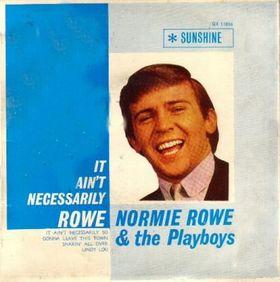
A: "It Ain't Necessarily So" / "Gonna Leave This Town"
B: "Lindy Lou" / "Shakin' All Over"
1965
Normie Rowe Sings
"i" (Sunshine QX-11068)
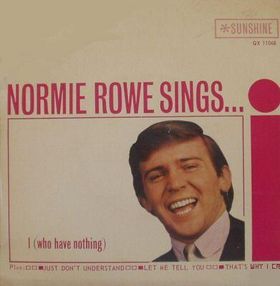
A: "I (Who Have Nothing)" / "I
Just Don't Understand"
B: "Let Me Tell You" / "That's Why
I Cry"
1965
Que Sera Sera
(Sunshine QX-11110)
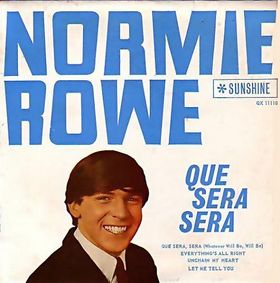
A: "Que Sera Sera" / "Everything's
All Right"
B: "Unchain My Heart" / "Let Me
Tell You"
Nov.
1965
Shakin' All Over (Sunshine
QX-11131)
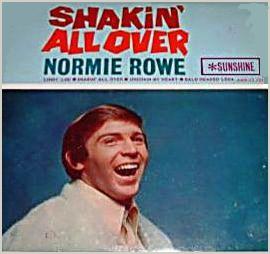
A: "Lindy Lou" / "Shakin' All
Over"
B: "Unchain My Heart" / "Bald
Headed Lena"
1966
Tell Him I'm Not
Home (Sunshine QX-11138)
1966
Call On Me
(Sunshine QX-11139)
1966
Pride & Joy
(Sunshine QX-11182)
?/1966
The
Stones That I Throw (Sunshine QX-11187)
Feb.
1967
Ooh
La La! It's Not Easy (Sunshine QX-11250)
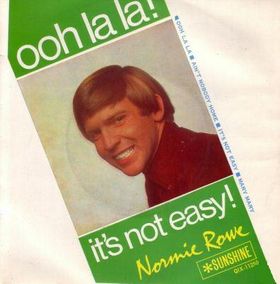
A: "Ooh La La" / "Ain't Nobody Home"
B: "It's Not Easy / "Mary Mary"
July
1967
Going Home
(Sunshine QX-11277)
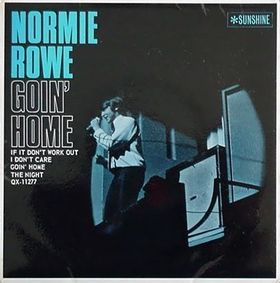
A: "Going Home" / "I Don't Care"
B: "If it Don't Work Out" / "The
Night"
Aug.
1967
Normie's New Four
(Sunshine QX-11295)
A: "Could it Be" / "Funny Bone"
B: "I Live in the Sunshine" / "Far
Beyond the Call of Duty"
Nov.
1967
Turn
Down Day (Sunshine QX-11406)
A: "Turn Down Day" / "Stop to
Think it Over"
B: "So Much Love" / "Stubborn Kind
of Fellow"
1968
Penelope (Sunshine
QX-11488)
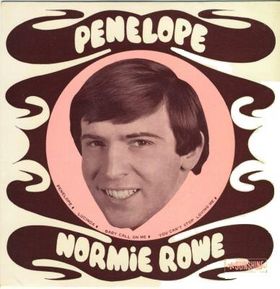
A: "Penelope" / "Lucinda"
B: "Baby Call on Me" / "You Can't
Stop Loving Me"
|
|
Albums
July 1965
It Ain't Necessarily So, But It Is
Normie Rowe (Sunshine QL-31734)
*gold record award
reissued
on Calendar
(R66-73)

(no
track listing available)
Nov. 1965
Normie Rowe A Go Go (Sunshine
QL-31802)
(gold record)
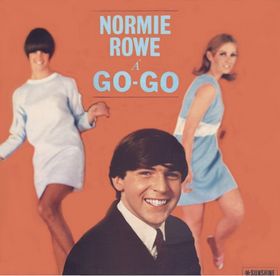
Side 1:
"Unchain My Heart"
"Ya Ya"
"Que Sera Sera"
"Call On Me"
"Bald Headed Lena"
"Too Bad You Don't Want Me"
Side
2:
"Poor Fool"
"I Want You Back Again"
"Jump Back"
"I Keep Forgettin' "
"You Thrill Me"
"Tell Him I'm Not Home"
Produced by Pat
Aulton
1965
A Wonderful Feeling (Sunshine QL-31871)
re issued on Calendar (R66-335)
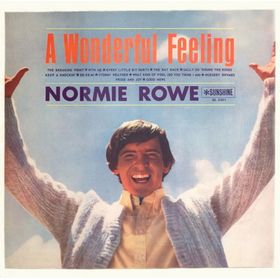
"The Breaking Point"
"With Me"
"Every Little Bit Hurts"
"The Rat Race"
"Sally go Round The Roses"
"Keep A Knockin'"
"Do-re-Mi"
"What Kind of Fool (do You Think I Am)"
"Nursery Rhymes"
"Pride and Joy"
"Good News"
1966
Normie's Hit Happenings (Sunshine QL-32198)
reissued on Calendar (R66-553)
1966
So Much Love From Normie Rowe (Sunshine QL
32144)
1968
Everything's Alright
(Universal UP 768)
(compilation of first two LPs)
1969
Normie's Top Tunes (Universal SRA-250045)
1970
Hello (Sunshine L25093)
197?
Normie Rowe's Greatest Hits (Harlequin L 25138)
1974
Come Hear My Song (Summit SRA 250152)
1975
That's The Way I Am (Summit)
1975
Normie's Hit Tunes
(Summit SRA 249 9020)
2000
The Early Anthology (Festival D46111) 2CD
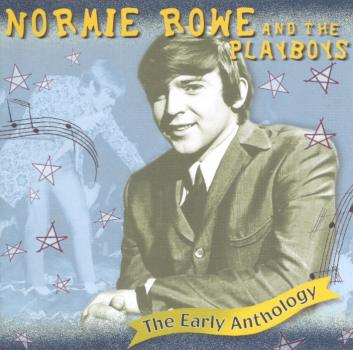
Que Sera, Sera (Whatever Will Be Will Be)
Shakin' All Over
It Ain't Necessarily So
Tell Him I'm Not Home
I (Who Have Nothing)
Call On Me
Pride And Joy
The Breaking Point
The Stones That I Throw
Ooh La La Ya Ya
Gonna Leave This Town
I Just Don't Understand
It's Not Easy
Ain't Nobody Home
Mary Mary
Going Home
I Don't Care
Sunshine Secret
But I Know
Turn Down Day
Stop To Think It Over
Penelope
Born To Be By Your Side
Breakout
Walking On The New Grass
Open Up The Skies
Just To Satisfy You
Drinkin' Wine
Spo-Dee-O-Dee
Everything's Alright
Lucinda
You Got Style
Too Bad You Don't Want Me
Let Me Tell You
That's Why I Cry
Lindy Lou
Unchain My Heart
Bald Headed Woman
I Keep Forgetting
Poor Fool
I Want You Back Again
Jump Back
What Kind Of Fool (Do You Think I Am)
Ain't That Good News
Every Litle Bit Hurts
With Me
Stormy Weather
Sally Go Round The Roses
Do Re Mi
Keep A Knockin'
Nursery Rhymes
Could It Be
Far Beyond The Call Of Duty
You Can't Stop Loving Me
Stubborn Kind Of Fellow
Baby Call On Me
I Confess
If I Don't Work It Out
"Can I Get A Witness"
"Tell Him I'm Not Home" (alternate EP/album version)
"Things Go Better With Normie Rowe"
|
References / Links
Sincere thanks to Normie Rowe
NormieRowe.com
http://www.normierowe.com/
Ian McFarlane
Encyclopedia of Australian Rock & Pop
http://www.anysite.com.au
Ed Nimmervol
Howlspace
http://www.howlspace.com.au
Vernon Joyson et al
Dreams, Fantasies & Nightmares: Australia
(Borderline Books, 1995)
Noel McGrath
Australian
Encyclopedia of Rock (Outback Press, 1978)
poparchives.com.au
http://www.poparchives.com.au
Rate Your Music
http://rateyourmusic.com/artist/normie_rowe














